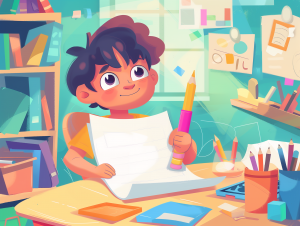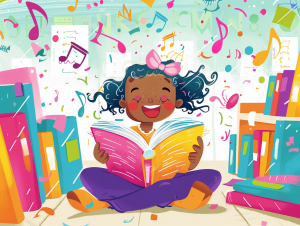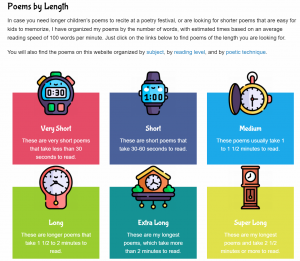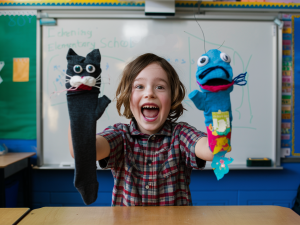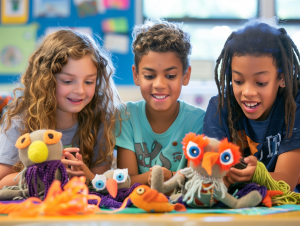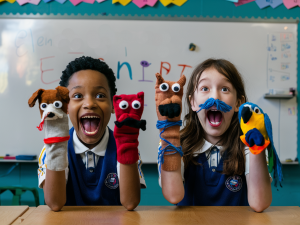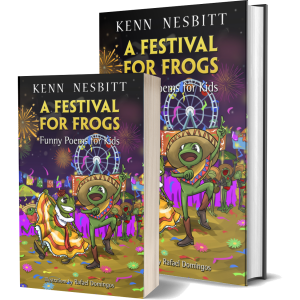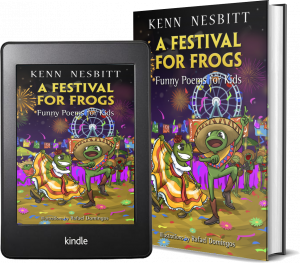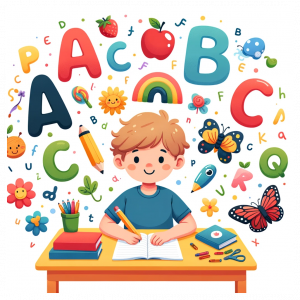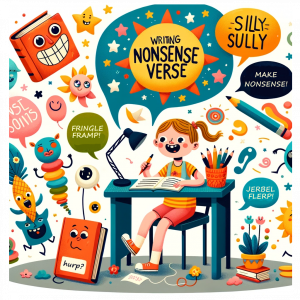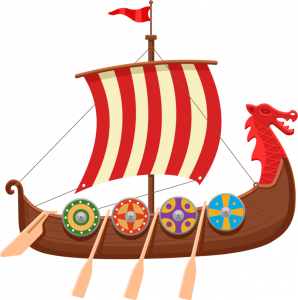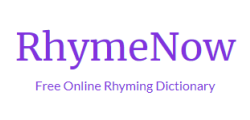As a children’s poet, I’ve had the privilege of witnessing firsthand how poetry can transform the learning experience for young readers. Today, I’d like to share some insights with you, the dedicated ESL/ELL/ELA/EFL/ENL/ESOL teachers (which I will refer to using the shorthand “ESL” in this article), on how poetry—especially humorous and rhyming verses—can be a powerful tool in your classrooms to help students achieve English fluency.
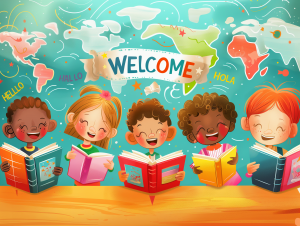
The Role of Poetry in Language Learning
Poetry provides a number of important benefits for ESL students:
- Rhythm and Rhyme: The natural cadence of poetry helps students internalize English rhythms, while rhyming words and other forms of repetition enhance memorization.
- Repetition: Many poems use repetitive phrases or structures, reinforcing vocabulary and sentence patterns effectively.
- Concise Language: Poems are often brief, making them less daunting for ESL students than longer texts.
- Cultural Exposure: Poetry can introduce students to English-language customs, idioms, and cultural references in an accessible manner.
While these benefits apply to all types of poetry, humorous and rhyming poems offer additional advantages that make them particularly suitable for beginning ESL learners.
The Special Appeal of Funny Poems
In my years of writing for children, I’ve found that humorous poetry has a special way of capturing students’ attention and keeping them engaged. When learning is enjoyable, it doesn’t feel like a chore. Moreover, humor creates positive emotions, which are linked to improved memory retention. Students are more likely to remember words and phrases that amused them.
Many humorous poems play with language creatively, helping students understand the flexibility of English and encouraging linguistic experimentation. Additionally, humor helps create a relaxed classroom atmosphere where students feel comfortable taking risks and making mistakes—a crucial factor in language learning.
Notable Poets for Children’s ESL Instruction
There are several poets whose work I believe can be especially effective in ESL classrooms:
Dr. Seuss: His books, such as The Cat in the Hat and Green Eggs and Ham, use simple vocabulary in creative, rhythmic ways that ESL students can easily grasp.
Shel Silverstein: Collections like Where the Sidewalk Ends and A Light in the Attic are full of surprising twists that delight children while teaching them about language structure and idioms.
Jack Prelutsky: Prelutsky was the first U.S. Children’s Poet Laureate and his work, including It’s Raining Pigs and Noodles, introduces new vocabulary in entertaining contexts.
And if I may, I’d like to mention my own work. In books like A Festival for Frogs, I often use everyday situations, especially ones relevant to kids, as a starting point for imaginative adventures, helping students connect language to their own experiences.
Practical Applications in the ESL Classroom
Based on feedback from teachers who’ve used my poems and those of other children’s poets, here are some strategies for incorporating poetry into ESL instruction:
- Daily Read-Alouds: Begin each day with a poem. This helps students connect written words with their sounds and meanings. Feel free to use poems from my other website PoetryMinute.org, which has 180 short poems, one for every day of the school year, from many different contemporary children’s poets.
- Vocabulary Exercises: Remove words from a poem and have students fill in the blanks, promoting vocabulary development and understanding of context clues. Many of the poems on Poetry4kids include fill-in-the-blank and find-the-rhyme student worksheets. Soon I plan to organize these by worksheet type and reading level for members of the website.
- Recitation Practice: Have students memorize and recite short poems to improve pronunciation, intonation, and public speaking skills. For more on this, read my lesson on “How to Recite a Poem Like an Expert.”
- Visual Comprehension: Ask students to illustrate poems, aiding comprehension and catering to visual learners.
- Creative Writing: Encourage students to write their own poems in English, practicing vocabulary, sentence structure, and creativity simultaneously. You will find dozens of simple poetry-writing lessons here.
- Thematic Integration: Choose poems that relate to other subjects being taught, reinforcing cross-curricular learning.
- Sequencing Exercises: Cut up poems into individual lines or stanzas and have students reconstruct them, developing logical thinking skills alongside language abilities.
Beyond Humorous and Rhyming Poetry
While humorous and rhyming poetry provides an excellent starting point, it’s important to gradually introduce other forms of poetry as students progress. Haiku can teach conciseness and imagery. Free verse can demonstrate the flexibility of language. Narrative poems can improve storytelling skills and comprehension of longer texts.
Each form of poetry offers unique benefits, and a well-rounded ESL curriculum should incorporate a variety of poetic styles over time. However, beginning with engaging, accessible forms like humorous and rhyming poetry can help establish a strong foundation and a positive attitude toward English learning.
Long-Term Impact
From my interactions with teachers and students, I’ve seen how integrating poetry into the ESL curriculum does more than help teach language; it fosters a lasting appreciation for English. Students who associate the language with enjoyment are more likely to engage with English content outside the classroom.
Furthermore, the skills developed through poetry—understanding rhythm, recognizing patterns, appreciating wordplay—transfer to other areas of language learning. Over time, students should see improvements in overall fluency, reading comprehension, and writing skills.
While all forms of poetry can contribute to language acquisition, humorous and rhyming poems offer an especially effective starting point for young ESL learners. By beginning with these engaging forms and gradually introducing other poetic styles, you can create a rich, varied language learning experience for your students.
From Dr. Seuss’s whimsical rhymes to more complex poetic forms, there’s a wealth of material waiting to be explored in your ESL classrooms. By harnessing the power of poetry, you can help your students not just learn English, but truly connect with the language, setting the stage for lifelong learning and appreciation.
As a poet, nothing brings me more joy than knowing my work, along with that of my fellow children’s poets, can play a part in this wonderful journey of language discovery. Keep up the fantastic work, ESL teachers!
- Enhancing ESL Fluency Through Children’s Poetry - July 24, 2024
- Sensory Poetry Lesson Plan: Bringing Poems to Life Through the Five Senses - July 17, 2024
- The Power of Rhythm: How Poetic Meter Enhances Memory and Recall - July 10, 2024

